Introduction
Can rabbits eat pears? Let’s find out.
Picture this: you’re cuddled up with your adorable bunny companion, ready to embark on a quest to discover the ultimate treat that will make their taste buds tingle with delight. You’ve heard whispers of the luscious and nutritious pear, and now it’s time to unveil its secrets.
How much is too much? And what about those delicious fruity pairings?
Prepare to have your bunny-loving heart flutter with excitement as we explore the fascinating journey of rabbits and pears. From the enticing sweetness to the myriad of health benefits, pears are a treat that will leave your furry friend hopping with joy.
But, my dear friends, because this adventure isn’t without its challenges. We’ll look into the world of moderation and the importance of balanced nutrition for your fluffy companion.
And guess what? We won’t stop at pears alone.
We’ll take it a step further and discover tantalizing fruit pairings that will make your rabbit’s taste buds do somersaults of happiness.
So, grab a seat, grab a pear, and get ready to embark on a tantalizing and educational journey. Join me as we uncover the secrets of pears and rabbits, and unleash the joy of treating our furry companions to a whole new level of deliciousness.
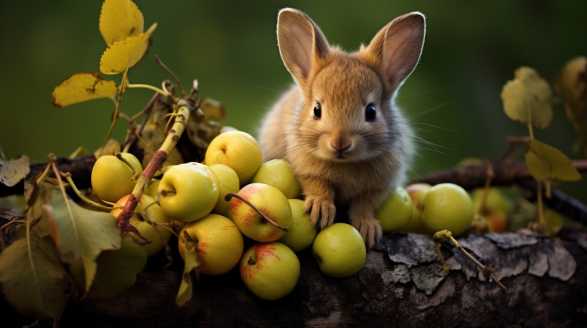
Key Takeaways
- Pears can be safely fed to rabbits in moderation as an occasional treat.
- Pears are rich in vitamins C and K, potassium, antioxidants, and dietary fiber.
- Pears should make up no more than 10% of a rabbit’s daily food intake.
- It’s important to choose ripe pears and remove seeds and cores before feeding them to rabbits.
- Other rabbit-safe fruit pairings include apples, bananas, and blueberries.
- Signs of digestive upset from pears include diarrhea, loss of appetite, and bloated stomach.
- Baby rabbits can eat pears, but moderation and age-appropriate introduction are crucial.
- Rabbits with sensitive stomachs may have varying tolerances to pears.
- Allergies to pears can occur in rabbits, so monitor for signs of itching, swelling, or difficulty breathing.
- Overfeeding pears to rabbits can lead to digestive issues, including diarrhea and gastrointestinal stasis.
- Pears should be offered in small portions, and variety is important for a balanced rabbit diet.
- Rabbits can safely consume different varieties of pears, including Bartlett, Anjou, Bosc, and Asian pears.
- Pears can be compared to other fruits like apples, bananas, and blueberries in terms of nutritional value.
- Apples, bananas, and blueberries offer similar nutrients to pears, but each has its own unique qualities.
- The overall diet of rabbits should consist primarily of hay, vegetables, and pellets, with fruits as occasional treats.
Pears as a Treat: How Much Can Rabbits Safely Consume?
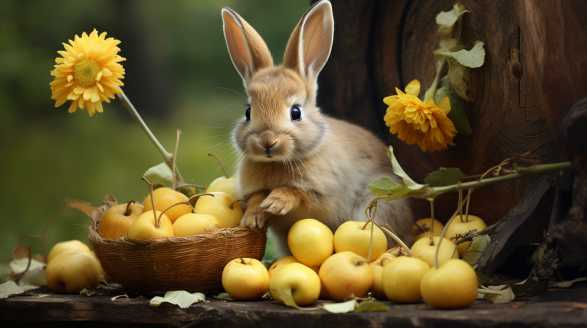
The Juicy Goodness of Pears
Pears are not only juicy and delicious, but they also pack a nutritional punch. Rich in dietary fiber, these fruits are a great source of vitamins C and K, as well as potassium and antioxidants.
Can Rabbits Eat Pears?
Yes, rabbits can safely eat pears in moderation. They are considered a safe and healthy treat for rabbits, but it’s essential to remember that treats should never replace their primary diet of hay and vegetables.
Moderation is Key
When it comes to feeding your rabbit pears, moderation is key. Pears should only be given as an occasional treat, making up no more than 10% of their daily food intake.
To prevent any digestive issues, it’s important to introduce new foods gradually, including pears. Start by offering a small slice or cube and observe how your bunny reacts before offering more.
The Art of Preparation
Before sharing a pear with your furry friend, here are a few important tips to consider:
- Choose ripe pears: Opt for pears that are ripe but not overly soft. This ensures that the fruit is at its nutritional peak and easier for your rabbit to chew.
- Avoid sugars and additives: Never feed your rabbit pears that have been coated in sugar or any other additives. These can be harmful to rabbits and should be strictly avoided.
- No seeds or cores: Remove all seeds, stems, and cores before offering pears to your rabbit. These parts can be a choking hazard and may contain chemicals harmful to your bunny’s health.
Fruit Pairings for Extra Flavor
If you want to take your rabbit’s treat game to the next level, consider creating fruity pairings that your bunny will absolutely love. Here are a few safe options to consider:
- Apples: Like pears, apples are safe for rabbits when given in moderation. Slice up some apple and pear to create a refreshing and nutritious snack.
- Bananas: Rich in potassium, bananas are a safe treat for rabbits. Mash some banana and pear together for a creamy and irresistible treat.
- Blueberries: These antioxidant powerhouses can be a delicious addition to a pear snack. Toss a few blueberries into the mix for added flavor and nutritional benefits.
Signs of Digestive Upset
While pears are generally safe for rabbits, it’s important to keep an eye out for any signs of digestive upset. Rabbits have sensitive digestive systems, and not all bunnies can handle the same foods.
- Diarrhea or loose stools
- Loss of appetite
- Listlessness
- Bloated stomach
- Excessive gas or rumbling in the belly
The Bottom Line
Pears can be a wonderful and healthy treat option for your rabbit if given in moderation. Remember, treats should never replace their main diet of hay and vegetables.
So go ahead, grab a pear, and share a delightful and nutritious snack with your furry companion. Just be sure to avoid overindulging and keep their health in mind.
Incorporating Pears into a Rabbit’s Diet: Best Practices and Recommendations
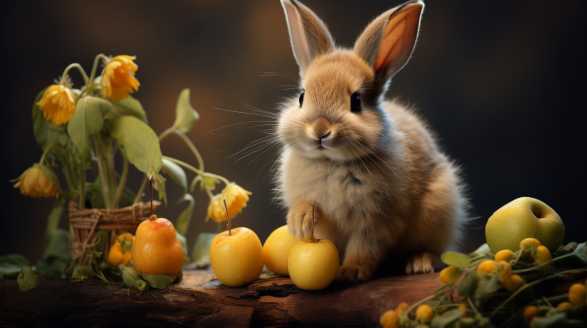
Benefits of Incorporating Pears
Including pears in your rabbit’s diet can offer several benefits:
- Enrichment and Mental Stimulation: Introducing new flavors, textures, and scents can engage your rabbit’s curiosity and keep them entertained.
- Increased Hydration: Pears, being juicy, can contribute to your rabbit’s hydration, especially during hot weather.
- Vitamin C Boost: Pears are a good source of vitamin C, an essential nutrient for rabbits.
Recommended Serving Size and Frequency
While pears have various health benefits, it is vital to remember that moderation is key. Pears should not exceed 10% of your rabbit’s overall diet.
Serving Size Guidelines:
- Small breeds: approximately 1 to 2 teaspoons of pear per day
- Medium breeds: approximately 1 to 2 tablespoons of pear per day
- Large breeds: approximately 2 to 3 tablespoons of pear per day
Remember, it’s always best to gradually introduce any new food into a rabbit’s diet to avoid digestive upsets. Start with a small amount and observe your rabbit for any adverse reactions.
Preparing Pears for Your Rabbit
Although rabbits can eat pears in their natural form, it’s essential to prepare them properly to ensure your bunny’s safety and enjoyment.
Cleaning and Peeling:
- Start by washing the pear thoroughly to remove any dirt or residue.
- Peel the pear to remove the skin. While the skin is safe for rabbits to consume, some pesticides or waxes used on the fruit may be harmful.
Slicing and Removing Seeds:
- Slice the pear into small, bite-sized pieces. This makes it easier for your rabbit to eat and reduces the risk of choking.
- Remove the seeds and core from the pear slices. The seeds can be toxic if consumed in large quantities.
Considerations and Precautions
While pears can be a tasty and healthy addition to your rabbit’s diet, there are a few considerations and precautions to keep in mind:
1. Introduce New Foods Gradually:
Rabbits have sensitive digestive systems, so it’s important to introduce pears (and any new food) gradually to prevent digestive disturbances. Observe your rabbit for any signs of bloating or diarrhea after introducing pears.
2. Avoid Overfeeding:
Feeding your rabbit too many pears can lead to weight gain and digestive issues. Remember to limit the serving size to maintain a balanced diet.
3. Monitor Allergic Reactions:
While allergies in rabbits are rare, it’s still crucial to monitor your bunny for any signs of allergies such as itching, swelling, or difficulty breathing. Consult a veterinarian immediately if you notice such symptoms.
4. Opt for Organic Pears:
To minimize the risk of exposing your rabbit to harmful chemicals, it’s best to choose organic pears whenever possible. Organic pears are grown without the use of synthetic pesticides or fungicides.
Other Fruits to Explore
In addition to introducing pears to your rabbit’s diet, there are other fruits that can be enjoyed in moderation:
- Apples (without seeds or core)
- Berries (strawberries, blueberries, raspberries)
- Melons (watermelon, cantaloupe)
Remember to always research and consult with a veterinarian to ensure the foods you offer are safe and suitable for your rabbit’s specific needs.
Adding pears to your rabbit’s diet can be a delightful and healthy experience for both you and your furry companion. By following best practices and recommendations, such as serving size control, proper preparation, and considering possible precautions, you can ensure that pears become a scrumptious and safe addition to your rabbit’s nutritional repertoire.
So, go ahead and offer your bunny a juicy pear slice—they’ll thank you with their adorable bunny hops and appreciative nose wiggles!
Can Rabbits with Sensitive Stomachs Tolerate Pears? Factors to Consider
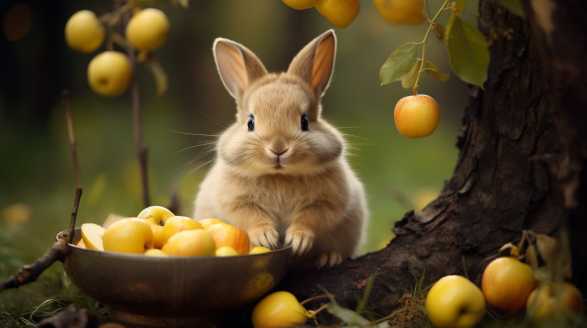
The Rabbit’s Delicate Digestive System
Rabbits have an intricate and sensitive digestive system. Their diet primarily consists of high-quality hay and fresh leafy greens, which provide the necessary fiber for healthy digestion.
Pears: A Delicious Treat for Rabbits?
Pears, with their sweet and juicy flesh, may seem like an enticing treat for rabbits. While they are safe for rabbits to consume, it’s crucial to be aware of several factors:
- Moderation is key: Pears should only be given to rabbits in small quantities as an occasional treat. Introducing large amounts of pears suddenly can lead to digestive upset.
- Freshness matters: Always choose ripe pears that are free of any mold or rot. Keep in mind that overripe or spoiled pears can cause gastrointestinal issues for rabbits.
- Organic is preferred: Whenever possible, choose organic pears to minimize exposure to harmful pesticides that can negatively affect your rabbit’s delicate digestive system.
Factors to Consider When Feeding Pears to Rabbits
Before offering pears to your rabbit, here are a few essential factors to consider:
1. Rabbit’s individual preferences
While some rabbits may be eager to try pears, others may show little interest. It’s crucial to observe your rabbit’s reaction to pears and make an informed decision based on their preferences.
2. Allergic reactions
Rabbits, like humans, can be allergic to certain foods. Before introducing pears into your rabbit’s diet, perform a patch test by giving them a small piece and observing any signs of allergy or sensitivity.
3. Sugar content
Pears, being a fruit, contain natural sugars. Excessive consumption of sweet foods can lead to weight gain, dental problems, and digestive issues in rabbits.
Benefits of Feeding Pears to Rabbits
While caution should be exercised, feeding pears to rabbits can have a few potential benefits:
1. Hydration
Pears have a high water content, making them a hydrating treat for rabbits. This can be especially beneficial during hot summer months or for rabbits prone to dehydration.
2. Vitamin C boost
Pears are a good source of vitamin C, an essential nutrient for rabbits. Incorporating small amounts of pears into their diet can help fulfill their vitamin C requirements.
How to Safely Introduce Pears to Your Rabbit
Now that you’re aware of the considerations and benefits, here’s a step-by-step guide on safely introducing pears to your rabbit:
- Start with a small piece: Begin by offering a tiny piece of pear as a treat. Watch closely for any signs of digestive upset such as diarrhea, bloating, or a lack of interest.
- Gradually increase quantity: If your rabbit tolerates the pear well, you can gradually increase the portion size, but remember to maintain moderation.
- Monitor for adverse reactions: Keep a close eye on your rabbit’s health and behavior after they consume pears. If you notice any negative reactions, discontinue feeding them pears immediately.
Alternatives to Pears as Rabbit Treats
If you’re hesitant about giving pears to your rabbit, fret not! There are numerous alternatives that can be just as exciting and healthy:
- Carrots
- Apple slices
- Cilantro
- Basil
- Blueberries
Remember, it’s essential to consult with your veterinarian before introducing any new treats or additions to your rabbit’s diet.
While rabbits with sensitive stomachs can tolerate pears in moderation, it’s important to consider various factors, such as the rabbit’s preferences, allergies, and sugar content. Always introduce pears gradually and observe your rabbit for any adverse reactions.
There are plenty of other delicious treats available. As a responsible rabbit owner, your priority should be your furry friend’s well-being and digestive health.
Exploring the Allergic Reactions of Rabbits to Pears: Common Symptoms
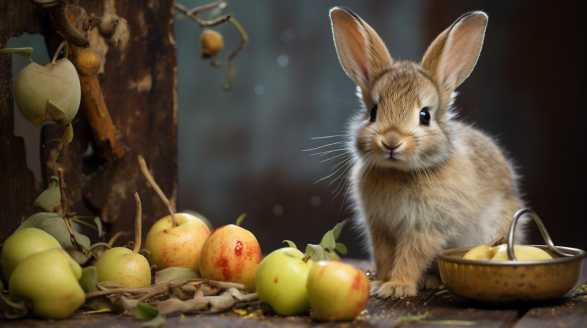
Have you ever wondered if rabbits can have allergic reactions to pears? Well, I sure have!
Join me on this journey as we dive into the common symptoms that our fluffy friends may experience. Let’s hop right in!
The Curious Case of Rabbit Allergies
Understanding Allergies in Rabbits
When it comes to allergies, most people think of sneezing, itchy eyes, and congestion. However, we must remember that rabbits are unique creatures with their own set of allergies.
How Rabbits React to Pears
The Unfortunate Trio: Common Symptoms
- Digestive Distress: One of the most prominent symptoms of a rabbit’s allergic reaction to pears is digestive distress. This can manifest in various ways, including diarrhea, excessive gas, or even stomach pain. Keep a close eye on their litter box habits to detect any changes.
- Appetite Changes: If your rabbit loses interest in their food after consuming pears, it could be a sign of an allergic reaction. They might suddenly become picky eaters, refusing not only pears but also their usual favorites. Offer a variety of other safe foods to ensure they maintain a healthy diet.
- Unusual Fur Loss or Rough Coat: Analyze your rabbit’s fur carefully. Allergic reactions may cause hair loss or a rough, unhealthy coat. If you notice any changes in their fur quality, it could be a potential sign that pears are causing a reaction.
Less Common But Still Worthy of Attention
While the trio of symptoms mentioned above are the most common, rabbits may exhibit other signs of allergic reactions to pears that are worth mentioning:
- Watery or crusty eyes
- Sneezing or coughing
- Itchy skin
- Swelling around the mouth or face
- Excessive scratching or licking
Understanding the Mechanics Behind Rabbit Pear Allergies
Rabbit allergies to pears stem from their sensitive digestive systems and unique digestive physiology. Remember that not all rabbits will have the same reaction to pears, as individual sensitivity can vary significantly.
The Hypersensitive Tummy
Rabbits have delicate gastrointestinal tracts that thrive on a fiber-rich diet, mainly comprising hay, fresh vegetables, and a small amount of rabbit pellets. While fruits should generally be given in moderation, some rabbits may struggle to digest certain sugars found in pears.
Handling Uncommon Sugars
Rabbit digestive systems have particular difficulty with fructose, a natural sugar abundant in fruits, including pears. Some rabbits may have a hard time breaking down this sugar, leading to digestive distress and allergic reactions.
How to Address Rabbit Pear Allergies
The Essential Steps
If you suspect that your rabbit is experiencing allergic reactions to pears, it’s crucial to take appropriate measures to ensure their well-being:
- Consult a Vet: The first and most important step is to consult a veterinarian experienced in rabbit care. They will help you diagnose any allergies and provide guidance on managing symptoms.
- Elimination Diet: Removing pears from your rabbit’s diet temporarily is essential to determine if it’s the culprit behind the allergic reactions. Be sure to consult your vet for a suitable replacement that meets your rabbit’s nutritional needs.
- Monitor Progress: Keep a close eye on your rabbit’s symptoms throughout the elimination period. Document any changes and share the information with your vet during follow-up visits.
Prevention is Key!
Prevention is always better than a cure, and the same applies to allergic reactions in rabbits. Here are some proactive steps you can take:
Safe Foods for Rabbits
Ensure a balanced and healthy diet by providing these staple foods:
- Fresh hay: A vital component of their diet for proper digestion.
- Fresh vegetables: Offer a variety of rabbit-safe veggies like kale, spinach, and parsley for added nutrients.
- Limited rabbit pellets: Look for high-quality pellets that are low in calories and rich in fiber.
Moderation with Fruits
While most rabbits can tolerate small amounts of fruit, it’s crucial to offer pearfectly sized portions in moderation. Treats should never exceed 10% of their overall diet to maintain a healthy balance.
Well, folks, we’ve just scratched the surface of exploring the allergic reactions of rabbits to pears. Remember, each rabbit is unique, and their reactions can vary.
If you suspect allergies, consult a vet and employ an elimination diet to identify potential triggers. Above all, maintain a well-rounded diet for your adorable furry friend that includes hay, vegetables, and a dash of moderation when it comes to fruits.
Can Baby Rabbits Eat Pears? Guidelines for Introducing Pears to Young Bunnies

I have always been fascinated by the adorable and fluffy nature of baby rabbits. As a rabbit enthusiast, I have spent countless hours researching the best ways to provide a wholesome diet for these cute little creatures.
I will look into this topic and provide you with essential guidelines for introducing pears to young bunnies.
Understanding the Nutritional Needs of Baby Rabbits
Before we dive into the world of pears, it’s important to understand the nutritional needs of baby rabbits. These delicate creatures require a balanced diet to ensure their optimal growth and development.
A robust diet for a baby rabbit includes:
- Unlimited fresh hay such as timothy or meadow hay
- A variety of fresh vegetables like leafy greens (spinach, kale, and lettuce) and veggies (carrots, bell peppers, and broccoli)
- A moderate number of pellets specifically formulated for young rabbits
- Freshwater available at all times
Now, let’s explore whether pears can be a part of a baby rabbit’s palate.
The Safety of Pears for Young Bunnies
To put it simply, yes, baby rabbits can enjoy pears as part of their diet. However, it’s important to adhere to certain guidelines to ensure their safety and well-being.
- Introduce pears gradually: Start by offering a small piece of ripe pear to your baby bunny. Observe any adverse reactions, such as gastrointestinal upset or diarrhea. If all goes well, you can slowly increase the portion size.
- Feed pears in moderation: While pears are safe for baby rabbits, they should be viewed as a treat rather than a staple food. The natural sugars in pears can cause health issues if consumed excessively, so it’s best to limit the amount of pear you provide.
- Opt for ripe pears: Choose ripe pears that are soft and easy to chew for your baby rabbit. Avoid feeding unripe or overly ripe pears as they may cause digestive discomfort.
- Remove the seeds and core: Before offering pears to your young bunny, be sure to cut them into small, bite-sized pieces and remove all seeds and the tough core. These parts can pose a choking hazard and should be discarded.
- Variety is key: It’s crucial to maintain a varied diet for baby rabbits. While introducing pears is exciting and enjoyable for your bunny, remember to offer a diverse range of vegetables and hay to ensure a well-rounded nutritional intake.
Additional Tips for Feeding Pears to Baby Rabbits
Now that we have covered the basics, let’s explore some additional tips for introducing pears to your young bunny’s diet:
1. Consider your rabbit’s age
The age of your baby rabbit plays a significant role in their ability to digest different foods. If your bunny is very young, it’s best to wait until they are at least three months old before offering pears for the first time.
2. Monitor for allergies
Just like humans, rabbits can develop allergies to certain foods. When introducing pears, keep a close eye on your bunny for any signs of allergies, including sneezing, wheezing, or skin irritation.
3. Remember the 85/15 rule
While it’s great to treat your baby rabbit to the occasional juicy pear, it’s essential to follow the 85/15 rule. This rule suggests that 85% of your bunny’s diet should consist of hay and vegetables, while only 15% can be dedicated to treats like pears.
4. Be mindful of your bunny’s overall health
If your baby rabbit suffers from a pre-existing health condition or has a sensitive digestive system, it is paramount to consult with a veterinarian before introducing new foods. They can provide tailored advice to ensure your bunny stays happy and healthy.
we have explored whether baby rabbits can enjoy pears as part of their diet. As long as pears are introduced correctly, in moderation, and as a treat, they can be a delightful addition to your bunny’s palate.
Now, go ahead and let your furry companion indulge in the deliciousness of pears while providing them with a nutritious and balanced diet. Happy pear munching, little bunnies!
The Effects of Overfeeding Pears to Rabbits: Potential Dangers
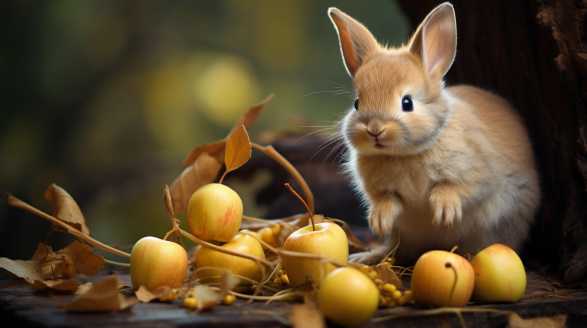
A Sweet Temptation
There’s no denying that pears are a tantalizing treat for us humans. Their juicy flesh and natural sweetness can make anyone’s mouth water.
The Digestive Dilemma
Bunnies have a sensitive digestive system, and any sudden changes to their diet can upset their delicate balance. Here are the potential struggles they may face when overfed pears:
- Diarrhea:
- Rabbits are prone to gastrointestinal issues, including diarrhea, and overfeeding pears can exacerbate this problem. The high sugar content in pears can upset the balance of beneficial bacteria in their gut, leading to loose stools.
- Diarrhea in rabbits is a serious condition that can quickly lead to dehydration. It’s crucial to monitor your bunny’s droppings and consult a veterinarian if you notice any sudden changes.
- Gastrointestinal Stasis:
- In the worst-case scenario, overfeeding pears can lead to a condition known as gastrointestinal stasis. This occurs when a rabbit’s digestive system slows down or even stops completely.
- The high sugar and water content of pears can disrupt the delicate fiber balance necessary for healthy digestion. This can result in a decreased appetite, lethargy, and a lack of droppings.
- Gastrointestinal stasis is a potentially life-threatening condition, so it’s vital to be cautious when introducing pears or any other fruit into your rabbit’s diet.
Moderation is Key
While the potential dangers of overfeeding pears to rabbits may seem disheartening, it’s important to remember that moderation is key. A small amount of pear as an occasional treat can be enjoyed by rabbits without significant consequences.
- Portion Control: Offer no more than a small slice of pear, about the size of your rabbit’s thumb, once or twice a month.
- Remove the Seeds: Pear seeds contain trace amounts of cyanide, which can be toxic to rabbits. Always remove the seeds before serving.
- Balancing Act: Make sure pears are not replacing the essential components of your rabbit’s diet, such as hay, fresh vegetables, and pellets. These provide the necessary fiber, nutrients, and roughage needed for healthy digestion.
Safer Alternatives
If you’re concerned about the potential risks of feeding pears to your bunny but still want to provide a fruity treat, there are safer alternatives to consider. Here are a few rabbit-friendly options:
- Small Berries:
- Blueberries, strawberries, and raspberries are not only delicious but also safe for rabbits when given as a treat in moderation.
- Like pears, always ensure proper washing and portion control when offering berries to your furry companion.
- Leafy Greens:
- Rather than fruits, leafy greens such as cilantro, parsley, and spinach are excellent choices for rabbits. They provide essential nutrients without the risk of upsetting their delicate digestive systems.
While pears may be a delectable human treat, overfeeding them to rabbits can have potentially dangerous consequences. Their sensitive digestive systems are easily upset by sudden dietary changes, leading to diarrhea and even life-threatening gastrointestinal stasis.
Always prioritize their main diet of hay, vegetables, and pellets to maintain their overall health and well-being. And if you’re looking for alternative fruity treats, consider small berries or rabbit-safe leafy greens.
The Nutritional Benefits of Pears for Rabbits: A Complete Guide
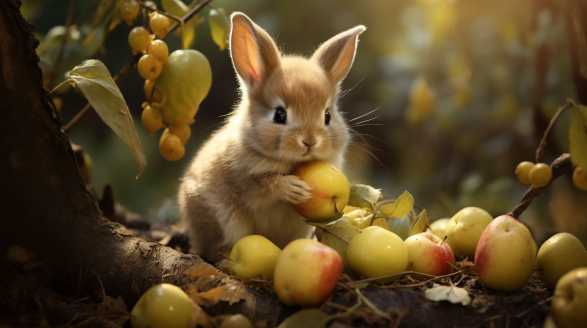
Bunny Delicacy: Why Rabbits Love Pears
I can’t help but wonder why rabbits have a particular affinity for pears. It turns out, these adorable critters are naturally drawn to the sweetness and juiciness of this fruit.
So, let’s explore the fantastic range of nutritional benefits pears offer to our furry pals:
1. Vitamins Galore
Pears are loaded with essential vitamins that are crucial for maintaining your bunny’s overall health. Here are some of the vitamins you’ll find in this delectable fruit:
- Vitamin C: A powerful antioxidant that supports immune system health.
- Vitamin K: Important for blood clotting and bone health.
- Vitamin E: Encourages healthy skin and boosts the immune system.
2. Fiber, Fiber, and More Fiber
Fiber is an essential component of a rabbit’s diet. It aids in maintaining a healthy digestive system and prevents gastrointestinal issues.
3. Hydration Hero
Proper hydration is vital for every living creature, and rabbits are no exception to this rule. Pears are composed of 84% water, making them a fantastic way to keep your bunny hydrated and quench their thirst effectively.
4. Feel Good with Antioxidants
Antioxidants are superheroes that protect our bodies from harmful free radicals. Pears are rich in antioxidants like flavonoids and carotenoids, which play a crucial role in promoting good health and reducing the risk of diseases in rabbits.
Pear-fection: Best Ways to Introduce Pears to Your Bunny’s Diet
Now that we know just how fantastic pears are for our bunnies, let’s discuss the best ways to incorporate them into their diet. Remember, the key is moderation and paying attention to your rabbit’s overall health and preferences.
1. Fresh is Best
Always opt for fresh, ripe pears. Make sure they are firm and not overly ripe to avoid any digestive issues for your furry friend.
2. Wash, Peel, Slice
Before offering a pear to your rabbit, it’s essential to wash it thoroughly and remove the peel. The peel can be difficult for your bunny to digest, so it’s best to peel it and slice it into small, bite-sized pieces.
3. Step-by-Step Approach
When introducing any new food into your rabbit’s diet, it’s important to take it slow. Start by offering a small piece of pear and monitor your rabbit’s response.
4. Treats in Moderation
While pears are undoubtedly a delicious treat for your bunny, remember that moderation is key. Treats should only constitute a small portion of your rabbit’s overall diet, along with their regular pellet food and a variety of fresh greens.
Beware of the Pits
Hold your furry friends close because here comes an important tidbit—a gentle reminder to remove the pits from pears before feeding them to rabbits. The pits contain small amounts of cyanide, which can be toxic.
Well, my fellow bunny enthusiasts, we’ve hopped through the nutritional wonderland of pears for rabbits. From vitamins to fiber and hydration, this delightful fruit is packed with benefits for our furry friends.
So, get those pears ready, and let your bunnies indulge in this pear-fect treat!
Can Rabbits Eat Different Types of Pears? An Examination of Varieties
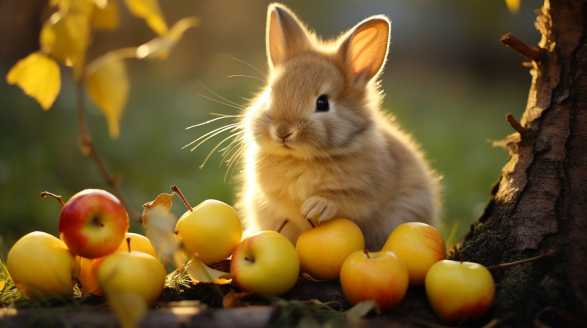
When it comes to our furry companions, such as rabbits, their diet plays a crucial role in their overall health and well-being. As responsible pet owners, it’s essential to provide them with a balanced and diverse diet.
we will explore whether rabbits can eat different types of pears or not. So, let’s dive right in!
Are Pears Safe for Rabbits?
Before delving into the intricacies of different pear varieties, it is important to establish the safety and suitability of pears as a whole for our furry friends. The good news is that pears are safe for rabbits to consume, as long as they are served in moderation.
Pears are an excellent source of vitamins and fiber, which can aid in your rabbit’s digestion. However, it’s imperative not to overfeed your pet since an excessive intake of any fruit might cause gastrointestinal issues.
Best Pear Varieties for Rabbits
Not all pear varieties are created equal, and some may be more beneficial for your fluffy companion than others. Let’s take a look at a few rabbit-friendly pear varieties:
- Bartlett Pears: Bartlett pears are an excellent choice for your rabbit’s snack time. They are both sweet and juicy, making them a tasty treat that bunnies love.
- Anjou Pears: Anjou pears, known for their firm texture, are another great option for your rabbit’s diet. These pears are slightly less sweet than Bartlett pears, but rabbits still enjoy them nonetheless.
- Bosc Pears: Bosc pears have a distinct flavor and a slightly grainy texture. While they are safe for rabbits, they might not be as appealing to them due to their unique taste and texture.
- Asian Pears: Asian pears come in various varieties, such as the Ya pear or the Hosui pear, and are a fantastic choice for rabbits. They are juicy, flavorful, and an absolute delight for your fluffy friend.
Remember, it’s always essential to introduce new foods gradually into your rabbit’s diet. If you plan on feeding your rabbit pears for the first time, start by offering a small amount and monitor their reaction closely.
Preparing Pears for Your Rabbit
Once you’ve selected a suitable pear variety for your rabbit, it’s important to prepare them properly to ensure your pet’s safety and enjoyment. Consider the following steps:
- Wash Thoroughly: Before offering a pear to your rabbit, make sure to give it a good wash under running water. This helps remove any potential pesticide residue or dirt that may be present on the skin.
- Peeling: While rabbits can eat pear skins, some pet owners prefer to peel the fruit to reduce the risk of any harmful chemicals. If you decide to peel the pears, be sure to remove only the skin and not the flesh, as rabbits can safely consume the entire pear.
- Remove Seeds: Pear seeds contain traces of cyanide, which can be harmful to rabbits if ingested in large quantities. To be on the safe side, always remove the seeds before serving the pear to your furry companion.
- Slicing: Slice the pears into small, rabbit-friendly pieces. This makes it easier for your pet to eat and reduces the risk of choking.
How Much Pear Should Rabbits Eat?
While pears are a healthy addition to your rabbit’s diet, it’s crucial to remember that they should be given in moderation. Pears, like any fruit, contain natural sugars that can be too much for rabbits if consumed excessively.
As a general guideline, rabbits should have no more than two tablespoons of fruit per day. This includes all fruits combined, including pears.
Other Considerations
When introducing pears or any new food into your rabbit’s diet, there are a few more factors to keep in mind:
- High-Fiber Diet: Rabbits’ primary diet should consist of hay, leafy greens, and pellets. Fruits, including pears, should only make up a small portion of their overall dietary intake.
- Age and Health: The age and overall health of your rabbit play a role in determining the amount and frequency of pear consumption. Consult with a veterinarian to ensure your rabbit’s dietary needs are met appropriately.
Rabbits can indeed enjoy different types of pears as part of their diverse diet. From Bartlett to Anjou, there are a variety of pear options that can be safely offered to our furry companions.
By following the guidelines mentioned, you can provide your rabbit with a healthy and enjoyable pear-snacking experience. Remember, always consult with a veterinarian if you have any concerns or questions regarding your rabbit’s diet.
Pears vs. Apples: Which Is a Safer Fruit Choice for Rabbits?
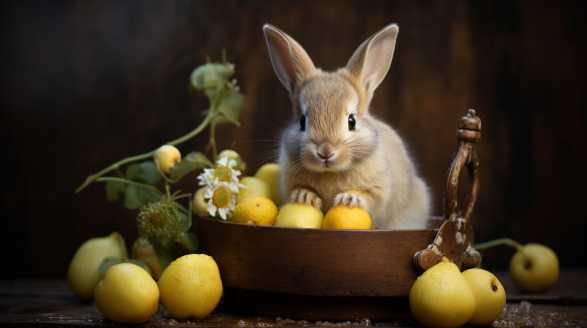
I
A Bunny’s Fruit Fantasia
Let’s start by clarifying that rabbits are herbivores, and their digestive systems are primarily designed to process fibrous plant matter such as hay. However, incorporating fresh fruits into their diet can offer a tasty and nutritious treat.
Apples: The Classic Crunch
Apples have been a long-standing favorite among rabbits, thanks to their appealing crunchy texture and mild sweetness. Here are some key points to consider when deciding whether to share apples with your bunny:
1. Nutritional Value
Apples provide rabbits with essential vitamins, including vitamin C, which is crucial for their overall health and immune system support. Additionally, apples contain dietary fiber that aids in proper digestion.
2. Moderation is Key
While apples can certainly be enjoyed by rabbits, it’s important to remember that they are relatively high in sugar content. Feeding too many apples to your bunny can lead to weight gain, digestive issues, and even dental problems.
3. Variety Matters
When selecting apples for your rabbit, opt for organic varieties free of pesticides and chemicals. It’s also important to remove the core, seeds, and stem, as these parts can be harmful to your bunny’s health.
Pears: A Pearfect Alternative?
Now let’s look into the world of pears and explore their suitability for rabbits:
1. A Unique Flavor Profile
Pears offer a distinct flavor that can be quite appealing to rabbits. Their texture is soft and juicy, providing a refreshing treat for your furry friend’s taste buds.
2. Nutritional Perks
Similar to apples, pears contain essential vitamins and dietary fiber. They are also known for their high water content, which can help keep your bunny hydrated.
3. Remove the Hazards
To safely share pears with your rabbit, remove the core, seeds, and stem, just like you would with apples. These parts can pose a choking hazard or even lead to cyanide toxicity in large quantities.
Quick Tips for Safer Fruit Consumption
While choosing between pears and apples for your rabbit, keep these general guidelines in mind:
1. Limit Serving Sizes
Small amounts of either fruit can be a delightful addition to your rabbit’s diet, but it’s important to remember that fruits should comprise only a small portion of their overall food intake. Aim to give your bunny no more than 10% of their daily diet in the form of fruits.
2. Offer Variety
Rabbits thrive on a diverse diet, so experiment with different fruits to keep their meals exciting and nutritionally balanced. In addition to pears and apples, consider introducing other rabbit-safe fruits like strawberries, blueberries, or raspberries in moderation.
3. Monitor Your Rabbit’s Health
Every rabbit is unique, so it’s essential to observe how your bunny reacts to specific fruits. If you notice any signs of digestive issues, loose stools, or decreased appetite after introducing pears or apples, it may be necessary to limit or remove these fruits from their diet.
When deciding between pears and apples as a treat for your rabbit, both fruits can be enjoyed in small quantities. While apples are crunchier and lower in sugar, pears offer a juicy and enticing alternative.
So go ahead and treat your fluffy friend with a slice of fruit, and watch their joy as they nibble away!
Remember, rabbits have specific dietary needs and preferences, so consult with a veterinarian for personalized advice regarding your rabbit’s diet.
Comparing the Nutritional Value of Pears to Other Fruits for Rabbits
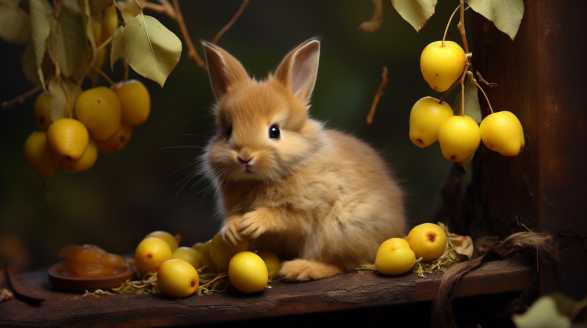
The Nutritional Benefits of Pears
Pears are not only juicy and tasty, but they also offer several health benefits for rabbits. Let’s take a closer look at the nutritional value of pears:
- Vitamin C: Pears are a good source of vitamin C, which is essential for the overall health and well-being of rabbits. Vitamin C boosts the immune system and helps prevent various illnesses.
- Fiber: Pears are loaded with dietary fiber, which promotes healthy digestion for rabbits. Fiber aids in maintaining a regular bowel movement and prevents gastrointestinal issues.
- Water Content: Pears have a high water content, making them an excellent option for keeping rabbits hydrated, especially during hot summer months. It also contributes to maintaining healthy skin and coat.
- Phytonutrients: Pears contain phytonutrients, including antioxidants, which help fight against cell damage and support overall health.
A Comparison of Nutritional Values
Now that we understand the nutritional benefits of pears let’s compare them to other fruits commonly offered to rabbits. Here’s a list of fruits and their respective nutritional values:
Apples
- Vitamin C: Apples contain vitamin C, but in a slightly lower amount compared to pears.
- Fiber: Apples are also a good source of fiber, much like pears.
- Water Content: Apples have a high water content, similar to pears, promoting hydration.
- Phytonutrients: Apples contain antioxidants like pears, supporting rabbit health.
Bananas
- Vitamin C: Bananas have a lower vitamin C content compared to pears and apples.
- Fiber: While bananas do contain fiber, it is less than what pears and apples offer.
- Water Content: Bananas have a moderate water content, but not as much as pears or apples.
- Phytonutrients: Bananas contain some antioxidants but not as many as pears or apples.
Blueberries
- Vitamin C: Blueberries have a comparable vitamin C content to pears.
- Fiber: Blueberries are also a good source of fiber.
- Water Content: Blueberries have a high water content, aiding in hydration.
- Phytonutrients: Blueberries are packed with antioxidants, similar to pears, providing health benefits.
Adding Variety to Your Rabbit’s Diet
While pears offer excellent nutritional value, it’s essential to provide a balanced diet for your rabbit. Variety is key!
Here are a few tips:
- Offer a mix of fruits: Rotate between pears, apples, bananas, and blueberries to provide a variety of nutrients. Remember to introduce new fruits gradually.
- Portion control: It’s crucial not to overfeed fruits to rabbits. Stick to small, bite-sized pieces and limit fruit intake to avoid digestive problems.
- Consider the whole diet: Fruits are a treat but should not replace the main components of your rabbit’s diet, including fresh hay, pellets, and vegetables.
Other Guidelines to Keep in Mind
While pears and other fruits can be a healthy addition to your rabbit’s diet, there are a few guidelines to follow:
Quality and Freshness
Always choose fresh, ripe fruits that are free from pesticides. Organic options are preferable, as they reduce the risk of introducing harmful chemicals to your rabbit’s diet.
Serving Size
Offer fruits as occasional treats rather than a primary food source. Aim to provide small quantities, no more than one or two tablespoons per day, depending on your rabbit’s size.
Diet Diversity
Remember, fruits should not make up the majority of your rabbit’s diet. A well-balanced diet consists of good quality hay, fresh water, rabbit pellets, and a variety of vegetables alongside occasional fruit treats.
So, how do pears compare in nutritional value to other fruits for rabbits? While pears offer many benefits such as high levels of vitamin C, fiber, and water content, it’s essential to offer a diverse range of fruits to meet your rabbit’s nutritional needs.
By incorporating pears and other fruits into your rabbit’s diet responsibly, you can ensure they receive the necessary vitamins and minerals while adding variety and excitement to their meals. Your furry friend will surely appreciate the tasty treats and stay happy and healthy!
Conclusion
Wow, what a journey we’ve been on! From exploring the safety and moderation of pears for rabbits, to discovering the potential dangers of overfeeding, to uncovering the luscious flavors and myriad health benefits that pears offer, we’ve covered it all.
But here’s the thing, my fellow bunny enthusiasts: this adventure doesn’t have to end here. Now armed with all this knowledge, we can embark on an ongoing culinary exploration with our furry friends.
Not to mention, the joy on our fluffy companions’ faces as they hop and munch away on their fruity delights.
So, let’s make a promise to ourselves and our beloved bunnies. Let’s continue to prioritize their health and happiness by providing a well-rounded and balanced diet that includes the occasional pear treat.
But remember, my friends, our journey doesn’t stop here. It’s up to us to keep learning, keep exploring, and keep sharing our discoveries with fellow rabbit enthusiasts who accompany us on this exciting adventure.
So, whether you choose pears, apples, bananas, blueberries, or any other rabbit-safe fruits, continue to delight your furry friend with a combination of flavors, textures, and nutrients. Cherish those precious moments of bonding and shared joy over a tasty treat.
And don’t forget, the love and care you pour into your bunny’s diet extends far beyond just the fruits. Hay, vegetables, pellets – every aspect of their meal is an opportunity to nurture and nourish them.
Now, my friends, it’s time to put our knowledge into action, armed with the excitement and joy that comes from preserving the health and happiness of our fluffy companions. So, let’s grab those pears and embark on this never-ending adventure together.
Frequently Asked Questions
Can rabbits eat pears?
- Yes, rabbits can eat pears in moderation. However, it’s essential to introduce new foods gradually to prevent digestive issues.
Are pears safe for rabbits?
- Overall, pears are considered safe for rabbits as an occasional treat. But remember to remove the seeds and core before offering them to your furry friend.
How much pear can rabbits eat?
- It is recommended to provide rabbits with a small slice or cube of pear, no more than twice a week, as part of a well-balanced diet.
Can rabbits eat all types of pears?
- Yes, rabbits can eat all varieties of pears, including Bartlett, Anjou, Bosc, and Asian Pears. Just ensure that the pears are ripe and not overripe or moldy.
What are the benefits of feeding pears to rabbits?
- Pears are a good source of fiber, vitamins, and minerals, such as vitamin C and potassium. They can contribute to a diverse diet and add some variety to your rabbit’s meals.
Can pear be harmful to rabbits?
- While pears are generally safe for rabbits, consuming excessive amounts of pear can cause stomach upset, diarrhea, or weight gain. It’s important to offer pears as an occasional treat only.
Can rabbits eat pear skin?
- Yes, rabbits can eat pear skin, but it’s advisable to wash the pear thoroughly before offering it to your rabbit. Some rabbits may prefer the skin removed, so it’s best to observe your pet’s preference.
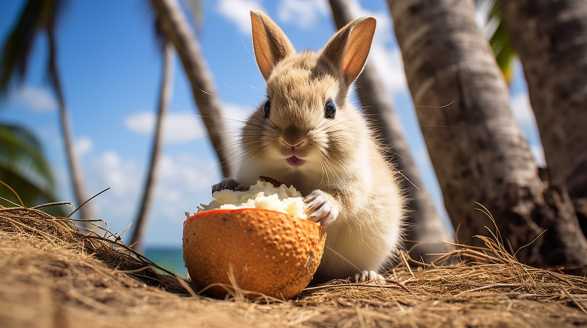
Can Rabbits Eat Coconut
Introduction Hey there, fellow rabbit enthusiasts! As someone who’s always on the lookout for ways to keep our fluffy little friends happy and healthy, the topic of coconut and its impact on rabbits has me bouncing with excitement! Imagine this: you’re cuddling with your bunny, giving them endless belly rubs, and suddenly, the thought pops […]
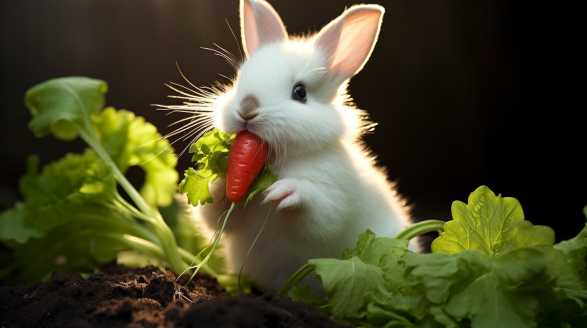
Can Rabbits Eat Radishes
Introduction Can rabbits eat radishes? Let’s find out. Picture this: a curious bunny hops into the room and sees you holding a radiant red radish. Suddenly, their eyes widen, ears perk up, and they can’t help but hop over to investigate. Well, that’s exactly what happened to me, and let me tell you, it was […]
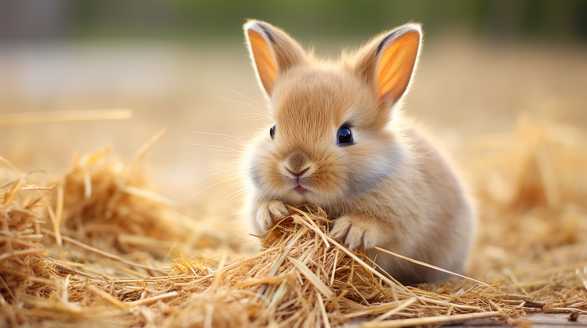
Timothy Hay For Rabbits
Introduction Hey there, fellow rabbit enthusiasts! Have I got an exciting topic for you today! Lets take a look at Timothy Hay for Rabbits Timothy hay is not just any ordinary grass. Oh no, it’s a powerhouse of nutrition and a game-changer when it comes to your rabbit’s health. But here’s the kicker – choosing […]
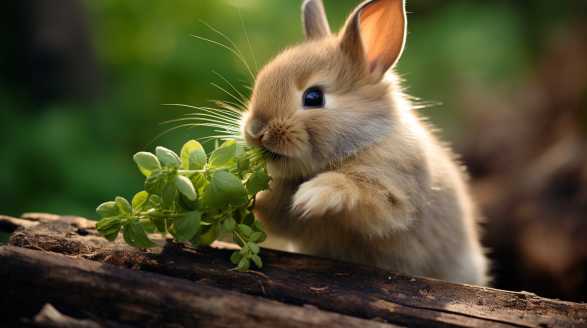
Can Rabbits Eat Oregano
Introduction Hey there, rabbit lovers! If you’re anything like me, you’re constantly on the lookout for ways to keep your furry friends healthy and happy. Oregano isn’t just a delicious herb we sprinkle on our pasta; it has some surprising advantages for our fluffy buddies too! we’ll cover everything you need to know about oregano […]
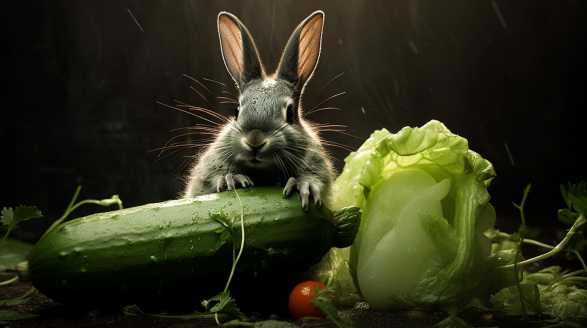
Can Rabbits Eat Cucumbers
Introduction Hey there, fellow bunny lovers! Are you ready to dive down the rabbit hole of cucumbers and their impact on our furry friends? Let’s find out, can rabbits eat cucumbers? Picture this: a world where your bunnies not only enjoy munching on their favorite treats but also stay hydrated, healthy, and have a smile […]
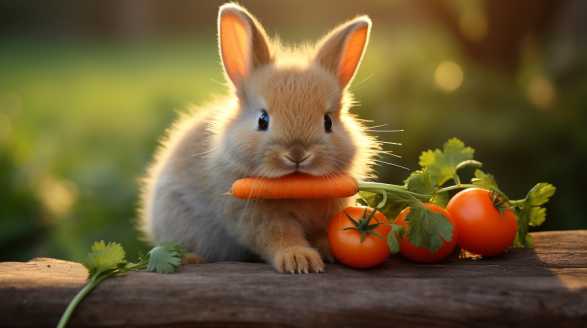
Can Rabbits Eat Carrots
Introduction Can rabbits eat carrots? Let’s find out. Picture this: an adorable bunny binkying with joy as it nibbles on a bright orange carrot, crunching away with delight. Carrots have long been hailed as a healthy snack for humans, but did you know that they may not be as innocent as they appear when it […]
